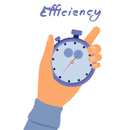What is NOT the Responsibility of Scrum Master?
Scrum Master role is a lot confusing. It is often misunderstood, which takes away the true essence of this role. So, let's discuss in detail some of the "don't" of Scrum Master to help clarify its role.

Scrum framework is becoming popular among organizations owing to its iterative-based project management approach. Scrum brings new roles that are not seen in traditional product management methodologies. One such role is Scrum Master, which is often misunderstood as a project manager. Due to unclear views about Scrum Master, many times the Scrum teams don't utilize this role rightly, which takes away the true purpose of this role. So, this article is meant to highlight some of the responsibilities of Scrum Master that are actually "NOT" the responsibilities of Scrum Master.
What is a Scrum Master?
As per the Scrum guide, Scrum Master is an individual who is responsible for establishing Scrum. The main job of a Scrum Master is to make everyone understand the Scrum framework. But Scrum Masters are more than just narrators of Scrum principles. They must showcase the soft skills required for mentoring Scrum team members. Moreover, they might have to provide guidance and support to members to make them reach a conclusion on their own. Basically, a Scrum Master:
- Acts as a true leader;
- Promotes and helps understand Scrum;
- Helps maximize the team's value;
- Helps stakeholders understand how to interact.
Overall, Scrum Master is accountable for the effectiveness of the Scrum team.
What a Team Misses Without Scrum Master?
Based on what Scrum defines as the role of the Scrum Master, many teams get confused about the effectiveness of the Scrum Master role. Many assume that the role of the Scrum Master is to:
- Ensure Scrum ceremonies;
- Schedule meetings;
- Facilitate communications between the development team and stakeholders;
- Prepare Scrum board;
- Address obstacles;
- Face blames for delays.
These are some of the assumed responsibilities that many Scrum teams believe a Scrum Master does. So, they even think that this role is not useful. However, it is seen that teams that don't have a Scrum Master role often face different complications, such as:
- Unproductive or boring meetings;
- Frequent interruptions;
- Lack of collaboration within the team;
- Understanding the gap between the team and stakeholders;
- Lack of vision and focus.
So, teams that don't value the role of Scrum Master mostly don't have a deep understanding of the Scrum framework. They think of Scrum as just the fancy way of project management with new artifacts. However, Scrum is more about increasing collaboration, maximizing business value, and ensuring customer-centric and faster time to market.
What are "NOT" the Responsibilities of Scrum Master?
Now that we know what Scrum Master is all about let's now discuss some of the misunderstood responsibilities of Scrum Master. Below are the 5 "Not" responsibilities of a Scrum Master:
1. Project Manager
"Scrum Master a fancy word for Project Manager" is one of the most common misrepresentations of Scrum Master. Most teams that are shifting from the traditional project development approach to Scrum are used to the project manager role, who serves as the main person to contact for the development team and stakeholders. But the fact is that there is no such role as a project manager in Scrum.
In Scrum, Scrum Master and the Product Owner don't serve as the bridge between stakeholders and the development team. Scrum empowers stakeholders to engage with the team directly, as the team is self-organizing and responsible for its actions. This is because Scrum intends to avoid time wastage when there is a middleman between stakeholders and the development team. The learning cycle becomes quicker, and the changes can be implemented much more easily. So, don't think of Scrum Masters as individuals who manage the project entirely. They ensure Scrum principles are followed and encourage communication between different project bodies.
2. Secretary
If teams don't consider Scrum Master as a project manager, they often consider Scrum Master as a "Secretary". If there is such a perception about Scrum Master, then it is mostly due to the false duties that a Scrum Master is doing. He might be presenting himself as the helping hand to the team in all matters, which makes the member rely on him. If that happens, then the Scrum Master might start receiving requests like, can you find a room where we can discuss, can you get in touch with the QA team and inform them that we need more time, and similar other requests.
Scrum makes development teams self-organizing, which means they are responsible for addressing their issues. If the Scrum Master keeps solving issues, then he won't be able to do his actual job. Therefore, he should confidently say yes or no to the requests received from the team. He must make the team understand his role and only accept the requests that lie in his role.
3. Decision Maker
Some Scrum Masters actually consider themselves the team's leader and start contributing to the critical decision-making process. Or sometimes, the team starts asking for opinions from the Scrum Master, and he unintentionally enforces his opinion. Let's understand it with the help of an example.
Consider that a team is stuck somewhere and has to decide which option to choose. Seeing that the team is stuck, the Scrum Master shows up and gives an opinion like “pick option X because it previously worked well in the previous project”. Now that's direct involvement in decision making, which is not the responsibility of Scrum Master. The better approach is that the Scrum Master say, “have you looked at what approach you followed in the previous project”. This way, the team will look for the solution themselves and remain self-organized.
4. Therapist
The Scrum guide terms Scrum Masters as "true leaders", which basically means the role of a coach or facilitator. This role is meant to facilitate the team to reach its full potential and encourage them to resolve their issues themselves. Owing to that, we have seen team members talking with Scrum Masters and sharing their problems, which is a good thing. But there is a difference between therapist and coach, and often Scrum Master starts acting as a therapist.
It is the duty of the Scrum Master to promote and enforce Scrum principles in the workplace and listen to team members, but he should not be the one resolving their issues. He might sometimes have to act as a coach, mentor, or just observer. Whenever a member shares a problem with him, he must encourage the member to solve the issue on his own. Since members are a part of a self-organizing team, they should address their issues on their own and just take guidance from Scrum Master.
5. The "Boss"
Although Scrum Masters are termed leaders, it does not mean they are the team's boss. Unfortunately, some Scrum Masters might start feeling like a boss, making the team uncomfortable with their role. They might start narrating their views, ask the team about progress, distribute work between teams, and do other boss-related activities. For example, if a team is discussing which estimation technique to use for product backlog estimation, the Scrum Master might say directly to use the Async Poker estimation technique.
When Scrum Masters start behaving as a boss, they might demotivate team members and take away the self-organizing aspects of the team. So, it is not the responsibility/duty of Scrum Masters to act as a boss. They are facilitators, couches, and mentors who don't enforce their decision and encourage team members to make their own decisions while adhering to Scrum principles.
Wrapping Up - The Actual Responsibilities of Scrum Master
In the Scrum framework, Scrum Master has an important role to play. On one side, a Scrum Master ensures the company adheres to Scrum principles, while on the other side, it serves as the leader Scrum teams need to remain self-organizing. Therefore, some of the actual responsibilities of a Scrum Master include:
- Make sure that the development team, stakeholders, and others concerned with the project understand and follow Scrum principles;
- Mentor the Scrum team;
- Encourage communication between teams and stakeholders;
- Help the Scrum team make decisions without forcing personal opinions.
Overall, a Scrum Master focuses on maximizing the benefits a company can get from Scrum. To sum up our conversation, we would recommend Scrum teams and especially Scrum Masters to first deeply understand what this role really expects and then focus on actual responsibilities and confidently say no to irrelevant demands.





